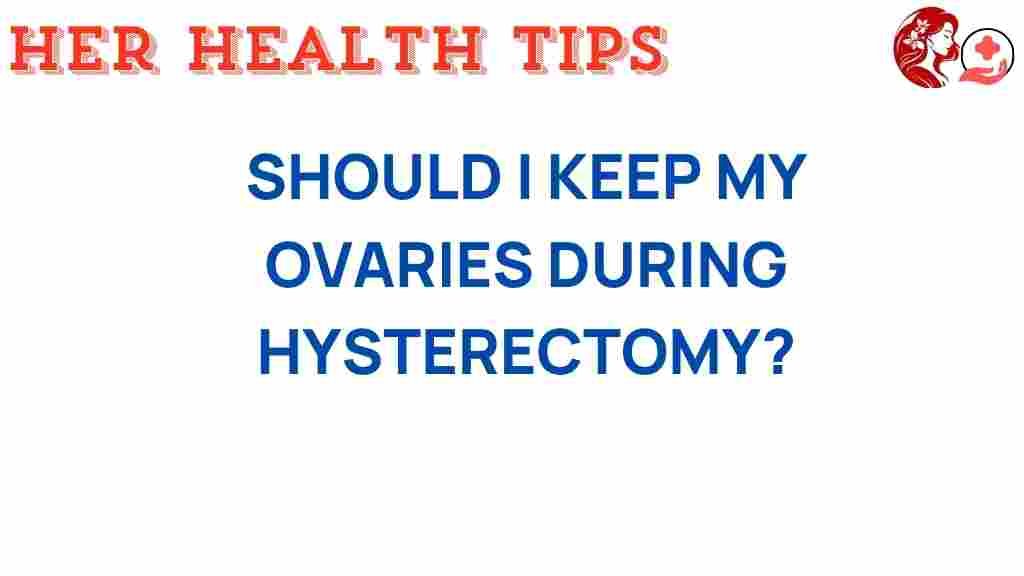The Ovarian Dilemma: To Keep or Not During Hysterectomy?
When facing a hysterectomy, many women grapple with a critical decision: whether to keep their ovaries or have them removed. This choice can significantly impact their women’s health, hormonal balance, and overall quality of life. In this article, we will explore the implications of this decision, the associated risk factors, and what to consider in terms of post-operative care. Understanding the ovarian dilemma is essential for making an informed surgery decision that aligns with your health goals.
Understanding Hysterectomy
A hysterectomy is a surgical procedure that involves the removal of the uterus. It can be performed for various reasons, including:
- Uterine fibroids
- Endometriosis
- Uterine prolapse
- Abnormal bleeding
- Cancer of the uterus, cervix, or ovaries
The procedure can be total, which involves removing the uterus and cervix, or partial, where only the uterus is removed. In some cases, the surgeon may also remove the ovaries and fallopian tubes, a procedure known as a salpingo-oophorectomy.
The Role of Ovaries in Women’s Health
The ovaries are crucial for reproductive health as they produce hormones such as estrogen and progesterone. These hormones play vital roles in:
- Regulating the menstrual cycle
- Maintaining bone density
- Supporting cardiovascular health
- Influencing mood and cognitive function
Removing the ovaries during a hysterectomy can lead to immediate menopause, which may trigger various symptoms, including hot flashes, mood swings, and increased risk of osteoporosis and cardiovascular diseases.
Factors to Consider When Making the Surgery Decision
1. Age and Menopausal Status
Your age and whether you are approaching or experiencing menopause are significant factors in deciding whether to keep your ovaries. Women who are close to menopause may find that the risks of keeping their ovaries outweigh the benefits, as they may not need hormone production for much longer.
2. Family History of Ovarian Cancer
If you have a family history of ovarian or breast cancer, your doctor may recommend removing your ovaries to reduce your risk. Genetic factors, such as mutations in the BRCA1 or BRCA2 genes, can also influence this decision.
3. Current Health Conditions
Existing health conditions can affect your surgery decision. Conditions like endometriosis or ovarian cysts may warrant removal of the ovaries, while other health concerns may make it safer to retain them.
4. Risk of Hormonal Imbalance
Removing the ovaries can lead to hormonal imbalances that may necessitate hormone replacement therapy (HRT). Discuss with your healthcare provider the potential need for HRT and its implications for your long-term health.
5. Quality of Life Considerations
Consider how the removal of your ovaries may affect your quality of life. Some women prefer to keep their ovaries to maintain hormonal balance and avoid the symptoms of menopause as long as possible.
Step-by-Step Process of Hysterectomy with Ovarian Removal
1. Pre-operative Consultation
Before the surgery, you will meet with your healthcare provider to discuss:
- Your medical history
- Reasons for the hysterectomy
- Risks and benefits of removing the ovaries
- Post-operative care options
2. The Surgical Procedure
The hysterectomy can be performed via different methods:
- Abdominal Hysterectomy: Involves making a large incision in the lower abdomen.
- Vaginal Hysterectomy: The uterus is removed through the vagina.
- Laparoscopic Hysterectomy: A minimally invasive technique using small incisions and a camera.
During the procedure, if ovaries are removed, it will be done alongside the hysterectomy.
3. Post-Operative Care
After the surgery, proper post-operative care is crucial. This may include:
- Managing pain with prescribed medications
- Monitoring for signs of infection
- Following up for any hormonal therapy needs
- Gradually resuming normal activities, as advised by your doctor
Troubleshooting Tips for Post-Operative Recovery
1. Managing Hormonal Changes
If you experience symptoms of hormonal imbalance after your ovaries are removed, such as:
- Hot flashes
- Mood changes
- Weight gain
Consult your healthcare provider for potential HRT options or lifestyle changes that can help manage these symptoms.
2. Recognizing Complications
Be aware of potential complications such as:
- Infection
- Heavy bleeding
- Blood clots
Seek medical attention immediately if you notice any concerning symptoms.
3. Long-term Follow-up
Regular follow-up appointments are essential to monitor your recovery and assess any long-term effects on your women’s health and reproductive health. Your doctor may recommend screenings and lifestyle adjustments based on your health status.
Conclusion
The decision to keep or remove your ovaries during a hysterectomy is a significant one that can affect your hormonal balance, risk of menopause symptoms, and overall health. It is essential to weigh the benefits and risks carefully and discuss them with your healthcare provider.
Ultimately, understanding your health, considering your personal circumstances, and being informed about the potential outcomes will empower you to make the best decision for your body. For more information on women’s health issues and surgical options, visit Women’s Health.gov or consult with a qualified healthcare provider.
Remember, you are not alone in this journey, and there are resources and support systems available to help you navigate your health decisions.
This article is in the category Reproductive and created by HerHealthTips Team
